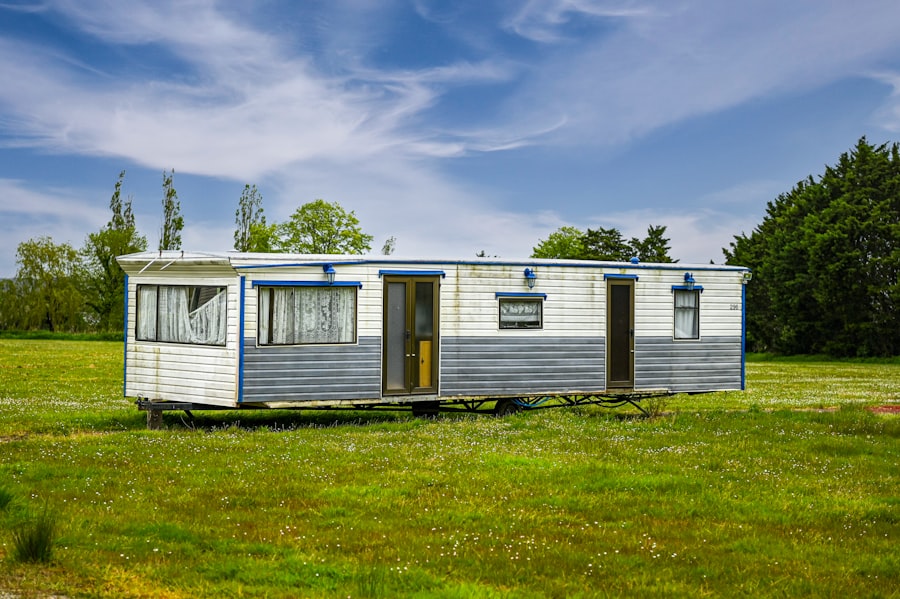The market for used trailer homes, often referred to as mobile homes or manufactured homes, has seen a significant evolution over the past few decades. Initially, these homes were viewed as temporary housing solutions or affordable alternatives for low-income families. However, the perception has shifted, and many now recognize the value and potential of used trailer homes as viable long-term residences.
This change in perspective is largely due to the increasing costs of traditional housing, which have made homeownership unattainable for many individuals and families. As a result, used trailer homes have emerged as an attractive option for those seeking affordable living arrangements without sacrificing comfort or quality. In addition to affordability, the used trailer home market is characterized by a diverse range of options.
Buyers can find everything from older models that require significant renovations to more modern units that are move-in ready. The variety in age, size, and condition allows potential homeowners to select a trailer that best fits their needs and budget. Furthermore, the market is influenced by regional factors such as local zoning laws, land availability, and community amenities.
Understanding these dynamics is crucial for anyone looking to navigate the used trailer home market effectively.
Key Takeaways
- Research the used trailer home market to understand pricing and availability.
- Carefully inspect the condition and history before purchasing a used trailer home.
- Explore various financing options tailored for used trailer home buyers.
- Consider renovation possibilities to improve value and comfort after purchase.
- Utilize local resources and negotiation strategies to find affordable deals nearby.
Factors to Consider When Buying a Used Trailer Home
When considering the purchase of a used trailer home, several critical factors come into play that can significantly impact the overall experience and satisfaction of ownership. One of the foremost considerations is the age and condition of the trailer. Older models may come with lower price tags but could require extensive repairs or upgrades to meet modern living standards.
Conversely, newer models may be more expensive but often come with better insulation, updated appliances, and fewer maintenance issues. Buyers should weigh the initial cost against potential long-term expenses to make an informed decision. Another essential factor is the location of the trailer home.
The site where the trailer will be placed can greatly influence its value and livability. Prospective buyers should consider proximity to essential services such as schools, healthcare facilities, grocery stores, and public transportation. Additionally, zoning regulations can affect where a trailer can be parked or whether it can be moved in the future.
Understanding local laws and community guidelines is vital to ensure that the chosen location aligns with personal preferences and lifestyle needs.
Finding Affordable Used Trailer Homes for Sale Near Me

Finding affordable used trailer homes requires a strategic approach that combines online research with local resources. One effective method is to utilize real estate websites that specialize in mobile homes. These platforms often provide comprehensive listings that include detailed descriptions, photographs, and pricing information.
Websites like Zillow, Realtor.com, and specialized mobile home sites can be invaluable tools for narrowing down options based on specific criteria such as price range, location, and size. In addition to online resources, local classifieds and community bulletin boards can yield hidden gems that may not be listed on larger platforms. Many sellers prefer to list their homes in local newspapers or community groups on social media to reach potential buyers directly.
Networking within local communities can also lead to opportunities; attending local events or joining groups focused on mobile home living can provide insights into available properties before they hit the market. Engaging with real estate agents who specialize in mobile homes can further enhance the search process, as they often have access to listings that are not widely advertised.
Inspecting a Used Trailer Home Before Purchase
| Inspection Area | Key Metrics | Acceptable Condition | Potential Issues |
|---|---|---|---|
| Structural Integrity | Frame condition, rust, cracks | No rust, no cracks, solid frame | Rust spots, bent frame, cracks |
| Roof | Leaks, water stains, material condition | No leaks, no stains, intact roofing | Water stains, soft spots, missing shingles |
| Plumbing | Water pressure, leaks, pipe condition | Good pressure, no leaks, intact pipes | Low pressure, leaks, corroded pipes |
| Electrical System | Wiring condition, outlets, breaker panel | Functional outlets, no exposed wiring | Faulty wiring, non-working outlets |
| Heating & Cooling | Functionality, age, maintenance | Works properly, recent maintenance | Non-functional, outdated units |
| Flooring | Soft spots, water damage, wear | Firm, no water damage, minimal wear | Soft spots, stains, warped areas |
| Windows & Doors | Seal condition, ease of operation | Seals intact, open/close smoothly | Broken seals, stuck or damaged |
| Appliances | Functionality, age, condition | All appliances work, well-maintained | Non-working, outdated, damaged |
| Interior Walls & Ceilings | Cracks, stains, mold presence | Clean, no cracks or stains | Cracks, water stains, mold spots |
| Exterior Siding | Damage, rot, paint condition | Intact siding, no rot, good paint | Cracks, rot, peeling paint |
Before finalizing a purchase, conducting a thorough inspection of a used trailer home is paramount. This step ensures that buyers are fully aware of any potential issues that could arise after the sale. A comprehensive inspection should cover both the interior and exterior of the home.
Key areas to focus on include the roof, plumbing systems, electrical wiring, and structural integrity. Signs of water damage, mold, or pest infestations can indicate underlying problems that may require costly repairs. It is advisable for buyers to either conduct the inspection themselves or hire a professional inspector who specializes in mobile homes.
A trained inspector can identify issues that may not be immediately visible to an untrained eye, such as foundation problems or outdated electrical systems that do not meet current safety standards. Additionally, buyers should inquire about any previous repairs or renovations made to the home, as this information can provide insight into its overall condition and maintenance history.
Financing Options for Used Trailer Homes
Financing a used trailer home can present unique challenges compared to traditional home loans. Many lenders view mobile homes as personal property rather than real estate, which can affect loan terms and interest rates. However, there are several financing options available for prospective buyers.
One common route is through chattel loans, which are specifically designed for mobile homes that are not permanently affixed to land. These loans typically have shorter terms and higher interest rates but can be a viable option for those looking to purchase a used trailer. Another financing avenue is through government-backed loans such as those offered by the Federal Housing Administration (FHA) or the U.S.
Department of Agriculture (USDA). These programs often provide more favorable terms for low-income buyers or those purchasing homes in rural areas. Additionally, some credit unions and community banks may offer specialized loans for mobile home purchases.
It is essential for buyers to shop around and compare different financing options to find the best fit for their financial situation.
Renovating and Upgrading a Used Trailer Home

Renovating a used trailer home can transform it into a comfortable and stylish living space while also increasing its value. Many buyers choose to undertake renovations shortly after purchase to address any outdated features or necessary repairs. Common upgrades include modernizing kitchens and bathrooms, improving insulation, and enhancing curb appeal through exterior improvements such as new siding or landscaping.
These renovations not only enhance the aesthetic appeal of the home but also contribute to energy efficiency and overall comfort. When planning renovations, it is crucial to set a realistic budget and timeline. Some projects may require professional assistance, particularly those involving plumbing or electrical work, while others can be tackled as DIY projects.
For instance, painting walls or installing new flooring can often be done without professional help and can significantly change the look of a space at a relatively low cost. Additionally, buyers should consider incorporating sustainable materials and energy-efficient appliances into their renovations to reduce long-term utility costs and environmental impact.
Tips for Negotiating the Price of a Used Trailer Home
Negotiating the price of a used trailer home requires preparation and strategy. Buyers should begin by conducting thorough research on comparable sales in the area to establish a baseline for what similar homes are selling for. This information provides leverage during negotiations and helps buyers avoid overpaying for their chosen property.
Understanding the seller’s motivations—whether they are eager to sell quickly or willing to wait for a better offer—can also inform negotiation tactics. During negotiations, it is essential to remain calm and composed while clearly communicating any concerns about the home’s condition or necessary repairs. If an inspection reveals issues that need addressing, these findings can serve as powerful negotiation tools to justify a lower offer.
Additionally, being flexible with closing dates or offering cash payments can make an offer more appealing to sellers who may prioritize quick transactions over higher prices.
Resources for Finding Affordable Used Trailer Homes for Sale Near Me
Several resources are available for individuals seeking affordable used trailer homes in their vicinity. Online platforms such as Craigslist and Facebook Marketplace often feature listings from private sellers looking to sell their mobile homes directly without involving real estate agents. These platforms allow buyers to communicate directly with sellers, potentially leading to better deals without additional commission fees.
Local real estate agencies specializing in mobile homes can also be invaluable resources. These agencies typically have extensive knowledge of the local market and can provide insights into available properties that meet specific criteria. Additionally, community organizations focused on affordable housing may offer resources or workshops aimed at educating potential buyers about navigating the mobile home market effectively.
By leveraging these resources, individuals can enhance their chances of finding an affordable used trailer home that meets their needs and budget constraints.



